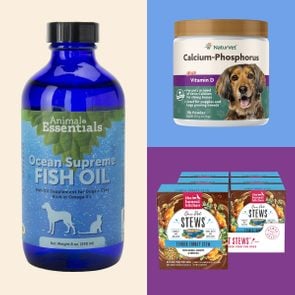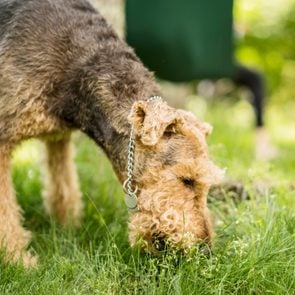Can Dogs Eat Popcorn? Here’s What Vets Say
Updated: Jul. 12, 2023
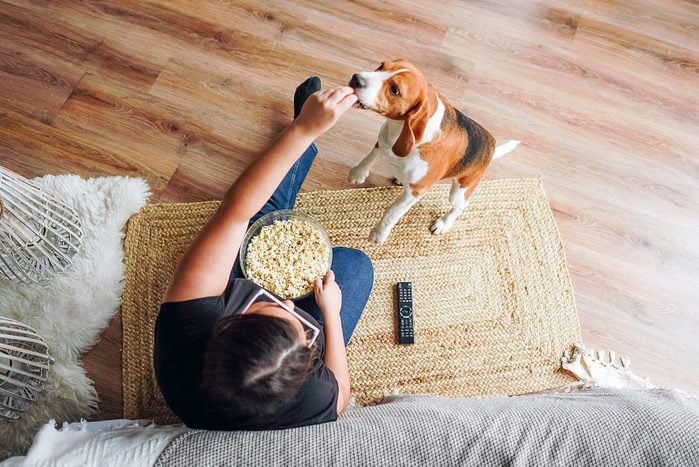
Movie night isn't complete without a big bowl of freshly popped kernels. But can dogs eat popcorn—or should you keep this snack to yourself?
It’s movie night, and you’re cuddled up with the essentials—cozy blankets, a classic family flick, your favorite canine companion and a big bowl of theater-worthy popcorn. And while those puppy-dog eyes beg for a taste, you might be wondering: Can dogs eat popcorn? It seems harmless enough, but is it considered a safe and healthy dog treat for our canine friends? Or would vets categorize it as a food toxic to dogs?
Remember that the best diet for dogs isn’t one-size-fits-all, but it’s best to ask questions if you’re unsure: Can dogs eat bananas? Can dogs eat ice cream? And important on movie night, is popcorn safe for our furry friends? We popped the question to the professionals to find out.
Get Reader’s Digest’s Read Up newsletter for more pet-friendly insights, humor, cleaning, travel, tech and fun facts all week long.
Why do dogs love popcorn so much?
Dogs love popcorn for the same reason they drool over other human food—it’s tasty. But there may be more to it. In a study published in the journal Public Library of Science ONE, researchers found that dogs want to eat the same food as humans to connect and be social.
Researchers had dogs choose between a plate with a single piece of food and a plate with larger amounts of food. Initially, the canines went for the larger portion. But when a human was introduced and showed a preference for the smaller plate, the dog chose the smaller portion. When humans signaled an intent to eat, it influenced the dogs’ behaviors. In fact, the most effective signals were when a human looked at the food, then back at the dog while talking encouragingly. Turns out, your dog probably likes tasty food (including these vet-recommended dog food brands), but they really like your food.
Can dogs eat popcorn?
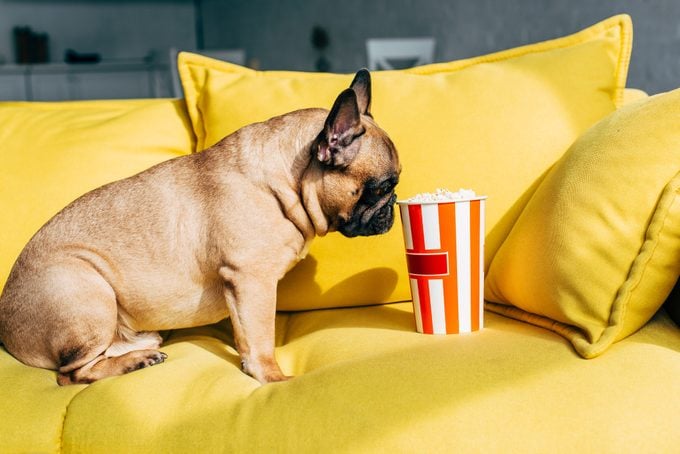
Yes, veterinarians give popcorn a paws-up—as long as it’s plain and air-popped. “Popcorn that is slathered in butter, salt or other seasonings should be avoided to prevent causing gastrointestinal upset in your dog,” says veterinarian Brian Evans, DVM, medical director at the pet telehealth company Dutch.
Generally, corn that is ground and cooked is easily digestible and a good source of energy, fiber, vitamins and minerals. And while plain popcorn is safe for dogs, steer clear of feeding them any unpopped kernels, as they can cause real damage to your dog’s teeth, Dr. Evans says.
If your dog has a known allergy to corn, skip the movie-night treat—it can lead to dog illness symptoms such as itching, scooting and skin and/or ear issues. “If the symptoms are mild and the skin doesn’t turn red, it may be OK to monitor your dog at home,” says Dr. Evans. But if you have concerns, he suggests checking in with your vet to stop the allergic flare-up and prevent any skin rashes from forming.
Can dogs eat microwave popcorn?
A piece of microwave popcorn here and there is unlikely to cause too many problems, says Stephanie Sheen, DVM, chief veterinary officer at Fuzzy. However, “eating microwave popcorn with added fat, salt, oil, preservatives and chemicals should be avoided,” she says.
Can dogs eat popcorn if the microwave variety doesn’t have any of those additives? The oil-free and salt-free microwave varieties should be fine, says Dr. Evans, but he would prefer you make homemade popcorn to avoid all the butter, oils, packaging excess and unnecessary ingredients. If you can’t avoid the added fats, reach for other human foods dogs can eat instead.
How much popcorn can a dog eat?
It’s easy to polish off an entire bowl of buttery and salty popcorn (sometimes before you even get to the meet-cute in a rom-com), but our pups shouldn’t follow suit. Remember: Only plain, air-popped, unsalted and unbuttered popcorn is OK, and keep the portions small. “It is best to give dogs popcorn in small amounts at a time to reduce the chances of them eating too much or choking,” says Dr. Sheen.
Popcorn or any other treat should not make up more than 10% of a dog’s daily caloric intake. So just toss a kernel or two every so often while you’re eating yours to spread the fun.
What happens if a dog eats too much popcorn?
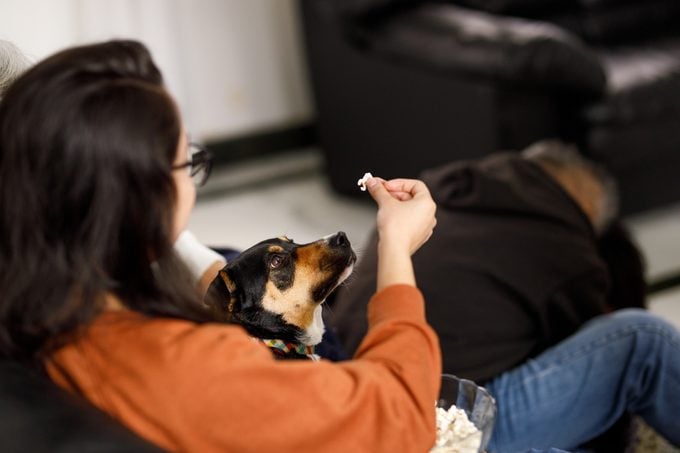
So your dog got into the popcorn stash while you were engrossed in the film. What happens next might depend on what kind of popcorn they overate. “If a dog eats too much popcorn, especially popcorn with added fat like oil and butter, it can cause gastrointestinal upset, such as vomiting and diarrhea,” says Dr. Sheen. “At significant amounts, it could even lead to inflammation of the pancreas, which digests fat in the body, and cause severe pain and dehydration that may require hospitalization.”
That goes for sweet varieties as well, such as candied and kettle corn. Beware of low- or no-sugar popcorn that includes artificial sweeteners like xylitol, which is poisonous to dogs, Dr. Sheen says.
What should you do if your dog ate popcorn?
A few bites of plain popcorn isn’t harmful. But can dogs eat popcorn in large amounts? The answer is generally no. “If you suspect your pet has eaten a significant amount of popcorn and has low energy, reduced appetite, diarrhea or is vomiting, it would be best to check with your veterinarian,” says Dr. Sheen. Depending on the amount eaten and the size of a dog, unpopped corn kernels could also cause blockages in the intestinal tract, she says.
If you worry your dog has eaten popcorn with xylitol in it, call your vet right away if the dog is exhibiting symptoms including weakness, lethargy, disorientation and seizures. The sugar substitute causes an increase in insulin in dogs, which can lead to low blood sugar after ingestion and significant disorders if not treated.
You’ll also want to check for popcorn hulls and brush your dog’s teeth to remove any remnants. Wolfing down all that popcorn means more hulls could become stuck in your dog’s teeth, just as they do in humans. “This can cause irritation to the gums and potentially lead to larger problems like gum damage or infection if present long-term.”
What are some healthy alternatives to popcorn?
Looking for another crunchy treat to offer your pup? There are plenty of healthy options—just be mindful of how many they’re getting. Toss dog treats sparingly, and break larger and/or higher-calorie treats into smaller pieces to avoid overfeeding.
Dr. Sheen feeds her dogs carrots, broccoli, cauliflower and fresh green beans. If your dog turns up his nose at veggies but drools over favorites like peanut butter, chicken or liver, whip up some easy-to-make healthy homemade dog treats (like banana bites or pumpkin puffs!) or dog-friendly cookies with adorable doggy cookie cutters.
You can also feel good about giving your pup the single-ingredient, freeze-dried PureBites. And for sensitive tummies or allergies, Zuke’s Mini Naturals are tasty corn-free and wheat-free options.
Sources:
- Brian Evans, DVM, medical director at Dutch
- Stephanie Sheen, DVM, chief veterinary officer at Fuzzy
- Public Library of Science ONE: “Do dogs (Canis lupus familiaris) make counterproductive choices because they are sensitive to human ostensive cues?”


